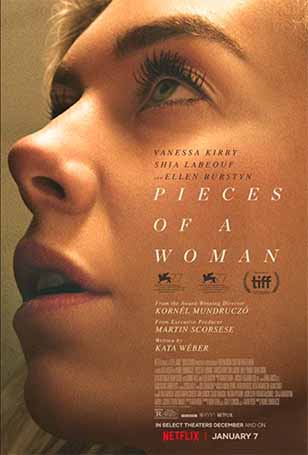 PIECES OF A WOMAN, Canada/Hungary/US, 2020. Starring Vanessa Kirby, Shia LaBoeuf, Ellen Burstyn, Iliza Shlesinger Benny Safdie, Sarah Snook, Molly Parker. Directed by Kornel Mandrucszo. 126 minutes. Rated M (Mature themes, sex, nudity, coarse language and drug use).
PIECES OF A WOMAN, Canada/Hungary/US, 2020. Starring Vanessa Kirby, Shia LaBoeuf, Ellen Burstyn, Iliza Shlesinger Benny Safdie, Sarah Snook, Molly Parker. Directed by Kornel Mandrucszo. 126 minutes. Rated M (Mature themes, sex, nudity, coarse language and drug use).
This is a powerful drama, especially in its first 30 minutes. It focuses on Martha, who is pregnant, in her 30s, lives with her partner and is often dominated by her mother. This becomes evident in the first few minutes where the narrative focuses on the partner, Sean (a strong performance by Shia LaBoeuf) who works on bridge construction in Boston harbour. He meets Martha (an award-winning performance from Vanessa Kirby, Princess Margaret in the first two seasons of The Crown), and they rendezvous with Martha’s mother, Ellen Burstyn (still a powerful presence on screen in her late 80s). They are buying a car for Martha.
While that introduces the characters briefly and effectively, it is the next 30 minutes that remain in the audience memory. Sean and Martha are at home, there is a beginning of contractions, some apprehension on Martha’s part, the plan to have the birth at home, finding the midwife is not available, some touches of panic, an alternate midwife, Eva (Molly Parker) arriving, reassuring, Martha going into the bath, then onto the bed, the contractions and the pushing, difficulties, checking heartbeats, the birth, Sean taking photos, then discovery that all is not well, Sean finding the paramedics and their arrival… Fade to black.
In describing the first 30 minutes, this is something of a spoiler but not exactly. While it describes something of what happens, it is the audience watching Martha’s experience in close-up, some extreme close-ups, that go well beyond mere description. The audience is in that room, one with Martha, anxious, observing the midwife, sharing Sean’s experience.
The strong drama of the next 90 minutes relies on what has happened to the audience in those first 30 minutes.
The principal focus, of course, is on Martha and the consequences of her experience. She seems to cope. Is quite self-contained, returning to work and ousting the occupant of her desk, checking on hospitals and their use of bodies for medical research (Sean and her mother opposed), even going to a club and a moment’s flirtation.
But, what puts the pressure on her is her mother’s domination, dissatisfaction with her daughter, wanting justice and compensation when the midwife is arrested. One notable moment is Martha’s mother's strong speech describing her own mother, the difficult birth during World War II, and the struggle for survival. And Ellen Burstyn is photographed in close-up which makes the storytelling more intense.
There is also a focus on Sean, his personal grief, his being looked down on by Martha’s mother, that he is ordinary and less-educated. There is question of how he deals with his frustrations, his sexual approach to Martha and her response.
There is a further complication in the plot with the hiring of a defence lawyer, Suzanne, a relation to the family (Sarah Snook).
After the personal drama and interactions, the action moves to the court room, the prosecution of the midwife, Martha on the stand interrogated by both prosecution and defence. Needing a break, she goes to a photographer’s shop, with the camera that Sean had used to photograph her and the baby. The photographs answer the questions put to her by the lawyers and she finds her feet, finds her inner strength.
A significant drama, well worth seeing despite the demands of the first 30 minutes and the birth. (The film is based on a play and both the screenwriter and director are Hungarian.)
Netflix
Released 7 January
Peter Malone MSC is an associate Jesuit Media